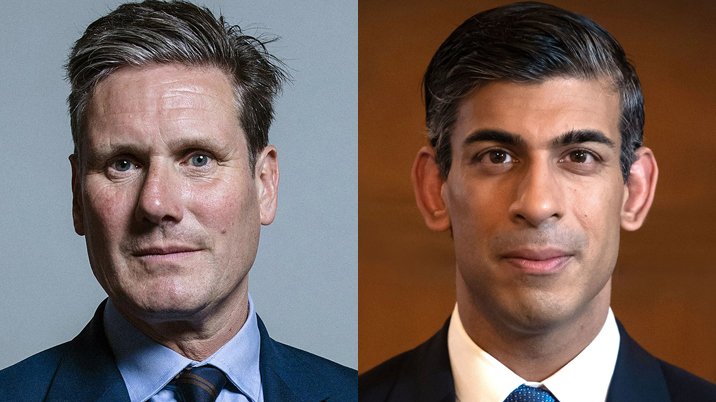
Manifesto time...
Conservative

What will you do when you win the lottery? I shall get the windows in my house replaced and employ a gardener and cleaner. Obviously bung a few quid to family, friends and deserving causes. Not very ambitious, and certainly not of any interest to the outside world.
What will Rishi Sunak do when he wins the election? Send some planes to Rwanda, and bung a few quid to those he regards as deserving. Being of advanced years, I might even be one of them. Again not very ambitious, and of very little interest to the outside world.
For his chances of fulfilling his dreams are almost as remote as mine. Yet our national newspapers and broadcasters have spent three days sharing his fantasy as though it were about to become reality.
It’s a tricky one this. The governing party spells out its strategy for what it would do if it were to retain power. The press is duty-bound to report it. How else can voters make an informed decision? The question is how should it be reported?
The Conservative party manifesto was launched on Tuesday at an event at Silverstone (because after the Downing St downpour, the Titanic shipyard, the exit signs and the Mickey Mouse ears, Tory strategists felt obliged to open the opportunity for car-crash metaphors). In the way of these things, various elements of the package slipped out / leaked / were briefed in advance. So on Monday morning, the Express has a spread on Sunak vowing to recruit 8,000 police officers. On Tuesday morning, the Express, Times, Telegraph and i all led on one or other aspect of what Sunak was going to do. With more inside. (The Guardian also splashed on the manifesto, but from a rather different perspective – what rightwingers would do if it fell flat.)

Then, yesterday, once the prime minister had delivered his speech (without apparent mishap), the story was again the lead for the Express, Telegraph, Times, Guardian, FT and Mail – which was returning to the fray after giving its front page a five-day holiday from the election.
Over those three days, splash headlines included £17bn of tax cuts, 100,000 illegal migrants to be deported, a 2p cut in national insurance, and tax breaks for landlords and homebuyers. Voters were also cautioned not to give Labour a blank cheque and that a vote for Reform was a vote to put Keir Starmer in No 10. This last from the Times yesterday, repeated the threat that made the splash for the Express earlier in the campaign – and, indeed, echoed the warnings from a different prime minister about a different opposition leader in 2019.

And then there were all the column inches inside. Of the 18 news pages the Express has dedicated to the election over the past three days, 12 have been about what the Conservatives want to do and two defending Sunak against Farage’s claims that he is unpatriotic and doesn’t understand “our culture”. If the ruling party were heading for a repeat landslide, this might make some sense; telling readers what they’re signing up for. Though, even if that were the case, the absence of scrutiny would still be worrying – the Express’s splash yesterday was all “Rishi says” with the only counter voice a sentence on the Institute for Fiscal Studies expressing scepticism about whether cuts to the welfare budget would provide enough money to cover the promised tax cuts.
But it’s not going to happen.
Meanwhile, the Mail and Times were saying “not bad for a start, but doesn’t go far enough, he should have been bolder, what’s he got to lose?” Well, nothing. But it’s all fantasy manifesto writing.
They just can’t help themselves, can’t break the “Rishi says” habit. Which wouldn’t matter so much if they were as assiduous in telling readers what else is on offer.
LibDem
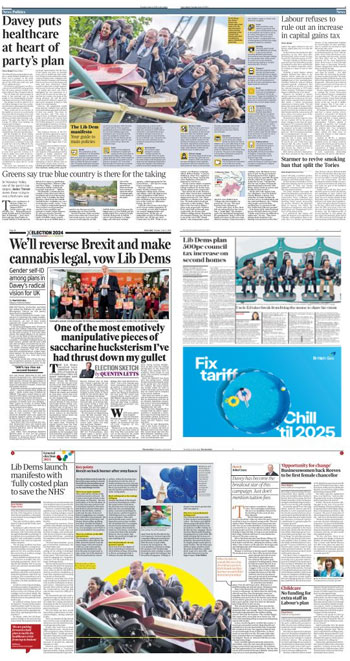
The LibDems, who are now just three points behind the Tories in the latest YouGov poll, published their manifesto on Monday. The Times and Guardian did the conventional point-by-point breakdown of policies, the Telegraph ran a scare story page lead about a 500% council tax increase for second home owners (giving councils leeway to introduce such rises is not the same as imposing them across the country) with a sketch alongside about Ed Davey riding a Thorpe Park rollercoaster, and the Mail ran a reverse Brexit and legalise cannabis page lead, also coupled with a sketch.
This, by Quentin Letts, was unnecessarily offensive about Davey’s references to his family, the headline, “One of the most emotively manipulative pieces of saccharine hucksterism I've had thrust down my gullet”, doing a pretty good job of telling you all you need (or want) to know.
Over at the Sun, Ryan Sabey offered an object lesson in how not to produce objective journalism with a report that started, “Britain will ride back into the clutches of the European Union and open borders under Liberal Democrat plans announced yesterday.” That pretty well set the tone. In the remaining 275 words of the story, readers were reminded of Davey’s various stunts and then told how he wanted closer ties with Europe and to extend the franchise to EU citizens. But the only three words quoted directly from either manifesto or party members were “formal and stable” to describe his preferred future relationship with Brussels.
Again, that might not be significant were it not for the fact that 85 of those precious words were given over to the Conservatives’ Stephen Barclay to take a swipe at both LibDems and Labour, saying: “Giving foreigners the right to vote is nothing more than a plot to take the UK back into the EU by stealth. At least the Lib Dems are open about their intentions to reverse Brexit. Labour have persistently shown they, too, want to drag us closer to Brussels and have already fiddled the ballot box in Wales to help them. A vote for the Lib Dems is a vote to put Keir Starmer in Downing Street.”

While all that was going on, the Mirror was going its own sweet way, first reporting Keir Starmer promising to ban the sale of energy drinks to under-16s (an old Tory policy promoted by Matt Hancock in 2019, but quietly ditched by Boris Johnson and Sajid Javid), and then focusing not on the Conservative manifesto launch, but on the television interview that caused the prime minister to rush back from the D-Day commemorations last week. Asked by Paul Brand if he’d ever experienced having to go without, Sunak replied, “oh yes, Sky!” Truly an example of childhood deprivation.
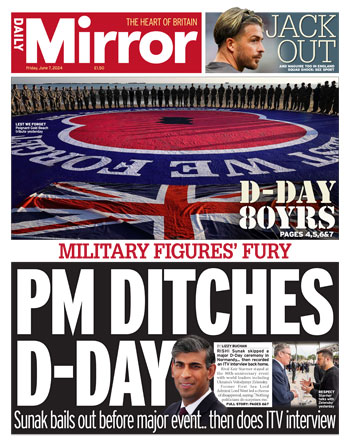
It was, of course, the Mirror that blew the lid on Sunak coming home early on D-Day – the one paper to recognise the importance of his actions. Hats off to deputy political editor Lizzy Buchan and her new editor. The rest of Fleet Street just didn’t get it. Some – like the Express and Telegraph – didn’t notice (or did notice and didn’t report) the prime minister’s absence as Keir Starmer chatted away with President Zelensky and as David Cameron posed with Biden, Macron and Scholz. Others mentioned it in passing, quoting Tory “Tory sources” as “playing down the diplomatic significance” of his early exit because he’d be seeing the other leaders at G7 next week anyway. They, like the prime minister, simply didn’t grasp that the diplomatic courtesies were due not to world leaders but to the veterans and relatives of the fallen.
The Guardian actually had the bones of the story and totally failed to recognise it. The last two sentences of its report on the international event said that Grant Shapps was deputising for Sunak, followed by a quote from Nigel Farage: “The prime minister has ducked out of the international D-day event to fly back to the UK to campaign. I am here in Normandy in a personal capacity because I think it matters. Does he?”
Maybe the Guardian dismissed the criticism because it came from Farage. Maybe the Guardian didn’t pick up on it because it had itself already failed to recognise the significance of the event – having pushed its coverage back to pages 18 and 19. Oh dear.

Love him or hate him, Farage was in Normandy for the whole weekend – as he is, apparently, every year. Maybe he makes the pilgrimage as a genuine mark of respect. Maybe he does it as a PR exercise to flaunt his patriotism. Whichever, he understood and understands that this is important. When you think back to the way the rightwing papers pilloried Michael Foot for his “donkey jacket” and how the Telegraph actually measured the angle of Jeremy Corbyn’s Cenotaph bow, it is hard to credit that neither title recognised that Sunak had shown a monumental lack of respect. Had Corbyn or Starmer been prime minister, they certainly would have done.
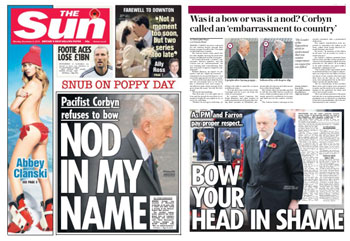
Labour
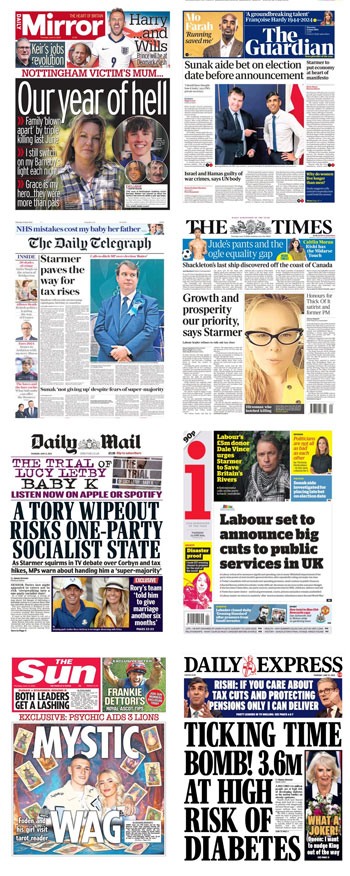
Today it’s Labour’s turn to announce its manifesto, so does it get the big build-up from friendly papers? Hardly. The Mirror splashes on Nottingham stabbing victims’ families’ “year of hell”, with just a little puff to Keir’s jobs revolution, while the Guardian is more interested in the Sunak aide being investigated over his bet on a July election. It has Labour and the economy as a single. The Times is more helpful with a splash saying “growth and prosperity are our priority”, but the Telegraph homes in on tax rises, the i on spending cuts and the Mail gets hysterical about a one-party socialist state. Both the Express and Sun look the other way, focusing on diabetes and, inevitably, the football.
They do, however, each manage a nod to last night's second leaders’ debate, hosted by Sky and Beth Rigby in Grimsby – an event that Starmer (described by the Mail as squirming) was deemed to have won by 64% to 34%, according to a snap YouGov poll.
It remains to be seen how much coverage the detail of the manifesto gets tomorrow once it’s been formally released. This is important. After keeping his cards so close to his chest for the first half of the campaign, Starmer must finally tell voters what they can expect from him.
Why am I so fearful that the first day of a football competition will prove more enticing for some?
Dodgy stats

Looking back to that first debate on Tuesday last week, the big takeaway was Sunak’s hammering of the £2,000 tax bill Labour would impose on the average family – and Starmer’s repeated failure to rebut it. The Mail, in common with other right-leaning papers, was delighted with the prime minister’s performance and splashed with “Fiery Rishi comes out fighting – and lands big blows”. But then much was made in the following days of the “lie going half the way round the world before the truth gets its boots on” and comparisons with the £350m on the side of a bus that has stuck in the public consciousness.
Given the fairly comprehensive rubbishing of the figures from various independent sources – and the disownership of them by a senior civil servant, who had actually told ministers not to use them, or at least not to attribute them to the Treasury – it seemed a bit rich for the Mail to come back the next day and produce an inside spread “Starmer on the ropes over tax warning”. By that time it was the Tories on the ropes. But there you go.
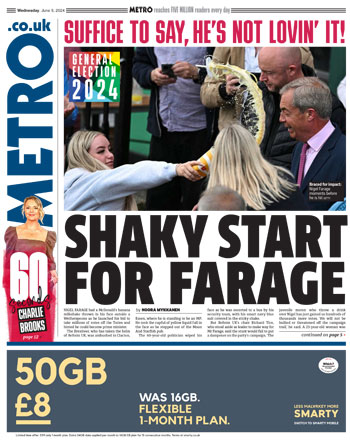
I have two observations to make on this, if I may. The first provides a salutary lesson for we journalists, which came courtesy of the YouGov polling organisation, which is using AI to determine which news stories are cutting through to the most people. It has promised regular updates. The first survey, conducted last Wednesday and Thursday, found that the election campaign was the story that 21% of the population had heard about most. The TV debate came second on 12%, with Nigel Farage’s return and his being hit with a milkshake just behind on 11%. The £2,000 tax claim struck the greatest chord with just 6%, which was still more than the Trump trial and Sunak wanting to bring back national service.
The next day, the D-Day commemorations had taken top spot, Farage had moved up a bit, as had the £2,000 claim (to 8%). The disappearance of Dr Michael Mosley was the most memorable story for 1% of respondents.
By Saturday, the D-Day anniversary was still on top, on 17%, but Sunak’s early departure had come in at number three as the most notable story for 11% of people. Mosley was now cited by 5%.
Then, after the weekend, there was a huge change, with Michael Mosley’s death the most remembered story for 30% and Sunak’s blunder not far behind on 26%. The £2,000 tax bill claim had by now shrunk in the public consciousness for all but 2% of the population.
We know that editors, particularly those working for Reach, depend heavily on algorithms showing them what people are clicking on and reading, but seeing these specific stories move up and down the table provides a fascinating insight into what really resonates – and to what extent propaganda and hammering home a message, true or false, works.

The other point I’d like to make about that £2,000 claim is that the figure – £2,094 to be precise, since that “precision” is presumably supposed to make the number more believable – is the amount the Tories say the average family would have to find over the course of a five-year parliament to fill Labour’s “black hole”. They don’t keep repeating the “over the course of the parliament” bit, just the “It’ll cost you two grand”, leaving you to assume that’s how much a year you’ll be worse off.
That’s because they’re trying to persuade you not to buy, that it’s too expensive. Now let’s look at the number in reverse. For if you’re trying to sell someone something that will cost them £400 a year, you try to make it seem cheap, a few coppers in the grand scheme of things. Maybe you’ll liken it to the cost of a cup of coffee or whatever.
So I thought I’d try the same exercise by comparing the cost of filling Labour’s “black hole” with the price of the Mail. If you paid full price for the daily and Sunday papers over five years – assuming the price doesn’t rise, and taking into account that there will be at least one leap year – it would cost you £2,367.10 (if you took out a subscription, it would set you back £1,911.85).
I’m sure the Mail would argue that that isn’t a lot of money. A bargain, in fact.
The Mail – taking time out
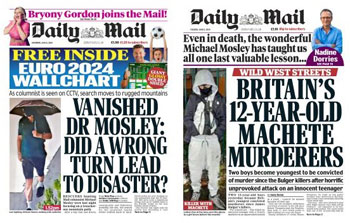
A Twitter friend messages, “Has the Mail given up on the election…or is it bet hedging?” A good question, for the paper that likes to think it runs the country went missing in action for nearly a week immediately after that “fiery Rishi” splash; first to shed a tear for the D-Day fallen, then to worry about Michael Mosley, then to report on two 12-year-olds convicted of the machete murder of a teenager. All nailed-on Mail splash subjects. Nothing to see here.
But really? Not a word in the puff or a picture down the side? Or a bottom-of-the-page arrow pointing to a pithy column? On Tuesday, the election didn't make its first appearance until pages 12 and 13, with Rishi promising to halve immigration, and when normal front-page service resumed yesterday, it was with an uninspired “blank cheque” splash. It’s out of character.
It’s also a sign of a paper coming to terms with the inevitable and trying to work out what it’s going to do when it happens. It wants the Tories to move to the right, but perhaps not quite as far right as Farage – it sees his ever-bolder comments about Muslims and Sunak not understanding “our culture” for what they are and finds them as repellent as most people do.
It has spent five years denouncing Starmer as an ocean-going dud who will tax everyone to the hilt and take us back into the EU; repeatedly telling readers that he cannot be trusted because of the many policy reversals that have prompted the paper to call him Sir Flip-Flop. So it’s impossible for it to say “he’s not so bad” – yet. But far from being a deep red socialist, Starmer is clearly a man of the centre, if not Tory lite.
So, for now, the Mail is having to do its utmost to get Sunak re-elected – the man it denounced only two years ago as a back-stabbing Brutus whose Machiavellian plotting brought down the Conservatives’ greatest electoral asset (who also happened to be a One Nation Tory with dangerously wet ideas about levelling-up and saving the planet).
That’s quite the high-wire balancing act. No wonder the paper took some time out when the opportunity arose.
Johnson going OTT
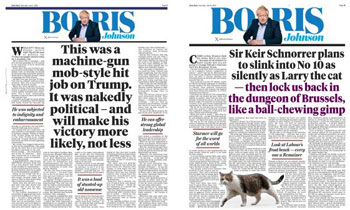
Speaking of that great electoral asset, Boris Johnson has, as we know, a new berth at the Mail from which to share his wisdom. From the very first column, there have been mutterings about whether the paper’s getting its money’s worth. Now there must surely be more serious questions about whether it should be giving him so much licence.
A couple of weeks ago, he was promoted at the top of the front-page warning that “dangerous” Starmer would be the most leftwing prime minister since the 1970s. The next week, he was there again, above a splash about Donald Trump railing at Biden’s “fascist state” after his conviction of 34 felonies, asserting that the prosecution was a “mob style hit job”. It’s one thing for Trump to claim that the whole world is against him, but it’s quite another for a former prime minister – albeit one who showed scant regard for the law of this land – to question the legitimacy of the American legal system.
Last Saturday, he was absent from the front, having lost his place to the recruitment of Bryony Gordon from the Telegraph and a Euros wallchart. Maybe just as well, for inside he asserted that “Sir Keir Schnorrer” planned to slink into No 10 as silently as Larry the cat and then “lock us back in the dungeon of Brussels like a ball-chewing gimp”.
Just another snidey nickname to add to Captain Hindsight and Captain Crasheroony Snoozefest? Not quite. It prompted Robert Peston to tweet “ ‘Schnorrer’ is the Yiddish word for beggar and scrounger. It is pretty offensive. I find it unsettling and offensive to see Johnson appropriating it to describe someone whose wife is Jewish – and especially when he says ‘if Schnorrer gets in, he will immediately begin the process of robbing this country of its new-found independence and make the UK the punk of the EU’.” Was he, he asked, being too sensitive? Not at all, replied Danny Finkelstein. He couldn’t imagine what on earth persuaded either Johnson or the Mail to think it was acceptable in any way.

An innocent mistake? Well, maybe, if only the Mail weren’t so alert to anti-semitism elsewhere – the pro-Palestinian “hate marchers”, Labour under Corbyn, the Guardian’s former cartoonist Martin Rowson, whose depiction of former BBC chairman Richard Sharp was said to contain a number of anti-semitic tropes. If the paper were able to recognise all the hidden symbols and describe them as sickening, surely it would have been aware of the meaning of the word “schnorrer”?
While we’re thinking of Danny Finkelstein, I have to commend his Times column on Farage’s return to the front line and the advantages of boringness over chaos. Best thing I’ve read all week.
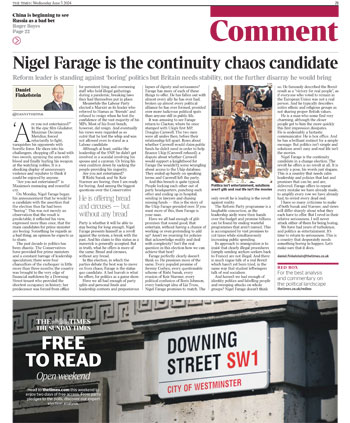
Michael Mosley
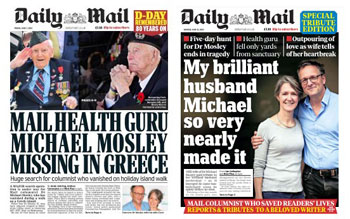
For those eager to get away from the election, there have been plenty of real-world stories – as evidenced by the Mail’s choice of splash when it took its campaign sabbatical. There was the horror of the young machete killers, the ongoing “Gio” Strictly saga, the upcoming Euros and the loss of two much-admired public personalities.
It was to be expected that the Mail would go big on the disappearance of Michael Mosley in Greece. For the cynically minded, it provided an escape from the embarrassment of Sunak’s D-Day blunder, but Mosley was a popular figure and it was a natural lead for the paper, given that he wrote for it. What jarred, however, was the way it couldn’t help but put itself centre stage yet again. Not only centre stage, but the very first word of the splash headline – “Mail health guru Michael Mosley missing in Greece”. Sometimes, just sometimes, it should realise it isn’t the most important element of any story.
It was equally understandable that it should give over several pages to the news after his body was found desperately close to the resort where he could have had medical attention. For most newspapers, a story has to be extraordinarily significant for it to run from the front right through to its natural conclusion inside without interruption. There is a reasonable argument that, for “his” paper, this was such a story. But I did find the “special tribute edition” tag at the top of the front just a bit over the top.
Front-page sportsmen

The other prominent death that saddened millions was that of the rugby league hero Rob Burrow, from complications of motor neurone disease, at the age of 41. He and his friend Kevin Sinfield had done so much to raise both awareness and hard cash – including securing £50m of government funding – to fight this cruel disease, earning the admiration of many, many people, including the Prince of Wales. Both were made MBEs in 2021 and these were “upgraded” to CBEs this year, the honours being conferred on them by the Prince, who paid tribute to Burrow last week, describing him as a “legend”.
The Mirror, which had campaigned to get the pair knighted, the Star and the Express all splashed on the death.
The Sun also led that day on a sportsman. But perhaps the one who said thanks to his mum after playing in the winning side of the European Championship final was the wrong choice.
There was more of Jude Bellingham on an early inside spread – in the hope that he will be on the winning side again come the Euros final next month – while Burrow was a single page lead further back. Thank heavens for Grace Macaskill, whose much more fitting appraisal was given a spread way back in the book. At least someone at the Baby Shard recognised the real story.

Which is not to say that Jude Bellingham doesn’t deserve a place on the front – just not on that day. Earlier this week, there were mumblings about newspapers using pictures of Bukayo Saka on their back pages after England’s defeat by Iceland. There were suggestions that this was reminiscent of the racism that followed the last Euros final when Saka, Rashford and Sancho missed penalties in the shoot-out against Italy.
It was unfair to use Saka to illustrate the defeat against Iceland, the argument went, because he had been on the pitch for only 25 minutes. Well maybe, but he was probably chosen by the Sun and Mail merely because he was throwing a paper dart, which allowed the headline “Plane awful”. Others went for white players and the headline Ice scream.

But if you still think the two titles that opted for Saka that day are inherently racist, then perhaps you should take another look at their fronts from yesterday – both of which feature a bare-chested Bellingham, as did the Mirror and Star.

And very nice too, if I dare be sexist for a moment.
Front page of the fortnight
For news judgment, I would back the Mirror – the only paper to pick up on Sunak’s D-Day desertion at the time. For appearance, it’s still a D-Day page, but this one from the Express.

Liz Gerard’s Notebook is a fortnightly column published in the InPubWeekly newsletter. To be added to the mailing list, enter your email address here.












